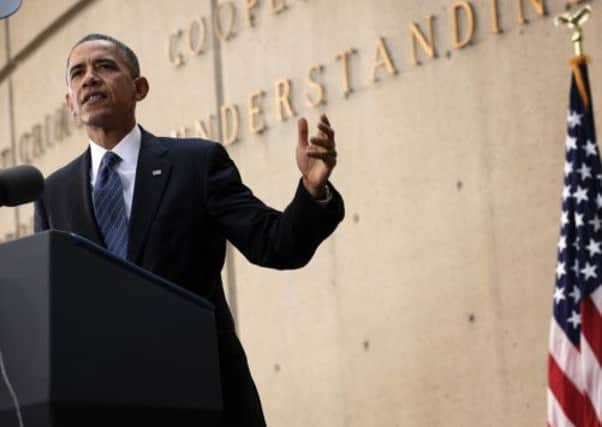Obama vows NSA review as Republicans up pressure


Senior Republicans greeted with derision an assertion that Mr Obama was unaware the National Security Agency (NSA) had monitored or collected the private communications of several world leaders.
Their claims that he had handled the spying scandal ineptly came as Congress began to question the nation’s intelligence chiefs over reports that the NSA had tapped the phone calls of millions of Americans in addition to its overseas activities.
Advertisement
Hide AdAdvertisement
Hide AdJames Clapper, director of national intelligence, and General Keith Alexander, the NSA director, were among those in the hot seat at yesterday’s hearing of the House intelligence committee.
“If the president did not know, that raises very serious questions about what he’s doing as chief executive,” said Congressman Peter King, a Republican. “The fact he would be going into negotiations and discussions and meetings with Angela Merkel or French leaders, or any leaders for that matter, and not be aware that there was surveillance going on of the private phone calls, either something is definitely wrong in his administration or he just has a totally hands-off attitude.”
Mr Clapper told the hearing: “We welcome this opportunity to make the case to the public.”
He said: “We do not spy on anyone except for valid foreign intelligence purposes and we only work within the law. We believe we have been lawful.”
He added that information provided to the White House “did not necessarily extend down to the level of detail”.
Dianne Feinstein, the Democratic California senator who is chairwoman of the Senate intelligence committee, had earlier asserted that neither her panel nor Mr Obama were told just how widespread the US spying programme actually was.
Ms Feinstein, previously a defender of the NSA, said she objected to the US spying on its allies and foreign leaders, adding: “It is abundantly clear that a total review of all intelligence programmes is necessary.”
Last night, the White House position on the spying claims – made in documents leaked by NSA whistleblower Edward Snowden, and including allegations that the US had collected intelligence on millions of phone calls in Spain and France – appeared to be a mixture of defiance and contrition.
Advertisement
Hide AdAdvertisement
Hide AdThe Wall Street Journal quoted anonymous NSA officials insisting that the claims were “inaccurate”, and that any information-gathering was done by and at the behest of the Spanish and French intelligence agencies, and handed over by them.
Meanwhile, Mr Clapper said newly declassified documents showed that US information-gathering under the Foreign Intelligence Surveillance Act was conducted lawfully, with the approval of a secret federal court and overseen by Congress.
Mr Obama acknowledged that relations with key allies had been harmed. And he said the intelligence agencies “could do better” and that was the reason he was initiating a review of the operations of the NSA overseas.
He said: “We give them policy direction, but what we’ve seen over the last several years is their capacities continue to develop and expand. What they’re able to do doesn’t necessarily mean what they should be doing.”
Jay Carney, the White House spokesman, said at a briefing: “We need to look at and make sure that we are not just gathering intelligence because we can but because we need it.”